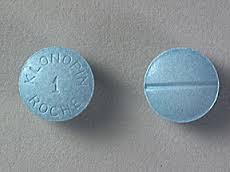Doctors openly prescribe Klonopin for the treatment of moderate anxiety as well as to those who suffer from seizures caused by a specific type of epilepsy. More commonly known as clonazepam, Klonopin is a member of the benzodiazepine class of drugs and can be habit forming when taken for recreational purposes as well as when prescribed.
 Klonopin is a benzodizepine. You can become dependent on and addicted to the medication.
Klonopin is a benzodizepine. You can become dependent on and addicted to the medication.According to Daily Med, Klonopin, "is available as scored tables with a K-shaped perforation containing 0.5 mg of clonazepam and unscored tablets with a K-shaped perforation containing 1 mg or 2 mg of clonazepam."
The medication is an antiseizure or antipanic medication that that can reduce the activity of the gamma aminobutyric acid which is responsible for inhibiting the neurotransmitters in the CNS. This drug will reduce anxiety, prevent seizures and help those who take it to feel at ease.
Unfortunately, when Klonopin is abused, there are risks for physical dependence and overdose. This medication is highly addictive and has the potential to cause addiction. Even when the medication is taken as prescribed, repeat Klonopin use can lead to tolerance and physical dependence which later requires professional treatment.
According to the DEA, when Klonopin is abused users will show various signs of abuse based on the method of use and the amount of use. Most people who abuse Klonopion will crush and snort the medication or chew the pills to produce near immediate effects. Such abuse, according to the DEA, is high among people who abuse heroin and cocaine.
The Following Signs of Klonopin Abuse May Be Seen in a User:
- Decreased Motor Activity
- Reduced Anxiety
- Relaxation
- Slurred Speech
- Lack of Coordination
- Sleepiness or Dizziness
- Loss of Memory
- Upset Stomach
- Nausea or Vomiting
- Insomnia
- Restlessness
- Tension
- Difficulty Thinking
According to the FDA, serious side effects can arise when Klonopin is abused. The following symptoms are considered dangerous and could lead to serious consequences:
- Thoughts of Suicide
- Suicidal Behavior
- Depression that is new or worse than previous case of depression
- Difficulty sleeping or trouble staying asleep
- Heightened Anxiety
- Agitation
- Restlessness
- Panic Attacks
- Extreme Irritability
- Aggressive Behavior
- Violence or Anger
- Mania
Signs of Klonopin Overdose May Include:
- Drowsiness
- Inability to Stay Awake
- Confusion
- Coma or Loss of Consciousness
- Inability to Think Clearly
- Slowed or Labored Breathing
WARNING: Left untreated, Klonopin overdose can have fatal consequences. Call 911 immediate if you suspect an overdose.
According to NIDA, Klonopin abuse can cause an array of serious side effects including extreme sedation and drowsiness that can lead to being taken advantage of if the drug is taken in a party scene. The reduced anxiety that occurs with the intoxication of Klonopin often leads to irrational thinking or to taking risks that would otherwise not be taken. Such can lead to promiscuous activity, unsafe sex, sharing of needles to use other drugs, driving while under the influence or otherwise behaving abnormally.
Additional Dangers Associated with Klonopin Abuse Include:
- Abnormal Feelings of Well-Being
- Lowered Inhibitions
- Inability to Concentrate
- Confusion
- Impaired Coordination That Can Lead to Injury
- Slowed Response
- Poor Memory
- Dizziness Which Can Lead to Injury
- Slowed Breathing Which Can Lead to Respiratory Distress
- Tolerance
- Addiction
- Withdrawal
- Overdose
- Death
According to the National Library of Medicine, benzodiazepines such as Klonopin which result in physical dependence often lead to subsequent withdrawal. Withdrawal syndrome is characterized by:
- Sleep Disturbances
- Irritability
- Tension
- Anxiety
- Panic Attacks
- Tremors
- Sweating
- Lack of Concentration
- Nausea
- Dry Heaving
- Weight Loss
- Palpitations
- Headaches
- Muscular Pain
- Joint Stiffness
- Changes in Perception
- Seizures
- Psychosis
Withdrawal symptoms can be both difficult to cope with and dangerous to the individual. Unlike symptoms of an opiate withdrawal, benzodiazepine withdrawal can be life-threatening. Initial symptoms usually come as anxiety and insomnia. These symptoms will last for a period of about 3-4 days. The second round of withdrawal symptoms, and the most difficult to cope with, tend to last about two weeks and may include an array of difficult to cope with side effects.
Once you've made the decision to seek help for Klonopin addiction, the next steps will be to find a place for detox and safe treatment. There are a number of treatment options available to you including counseling, therapy, medical intervention and support groups. Choosing the best program for your individual needs will require deep introspect into your current situation.
Consider Residential Treatment if:
- You do not have a safe, clean and sober place to live.
- You suffer from underlying health problems which may cause you to relapse.
- You have tried outpatient treatment in the past and have been unsuccessful.
- You do not think you will be fully committed to your recovery.
- You have relapsed in the past.
Choose Outpatient Treatment If:
- You have not attempted outpatient treatment before.
- You have a strong system of support from your friends and family.
- You are deeply committed to your recovery and ready to get sober.
- You have a job that you cannot miss.
- You have children or other responsibilities that would prevent you from being able to make the commitment to live in treatment.
Klonopin rehab programs offer unsurpassed treatment, therapy and care that is geared toward your individual needs. Remember, there is no one-size-fits-all method of treatment that is guaranteed to work for everyone, so don't be afraid to try out more than one treatment option as you seek the solution to your addiction.
